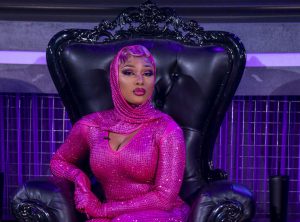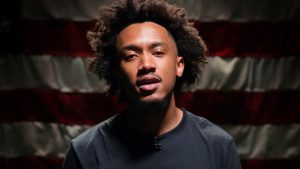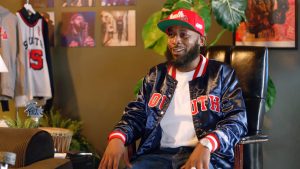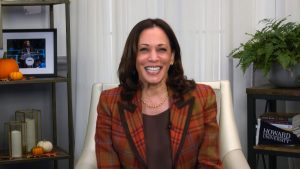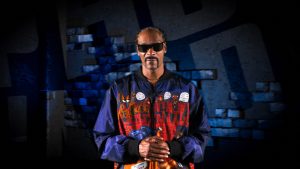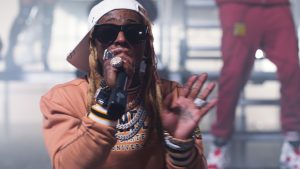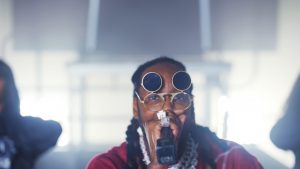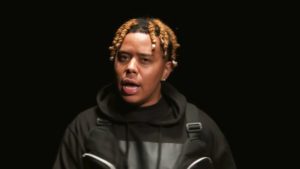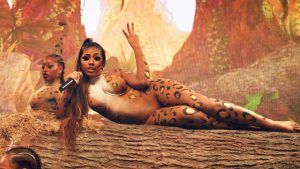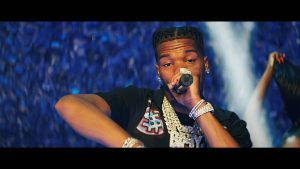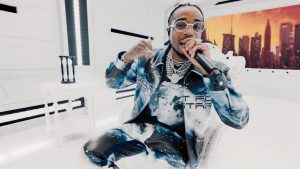March 13, 2021
by Carla Hay
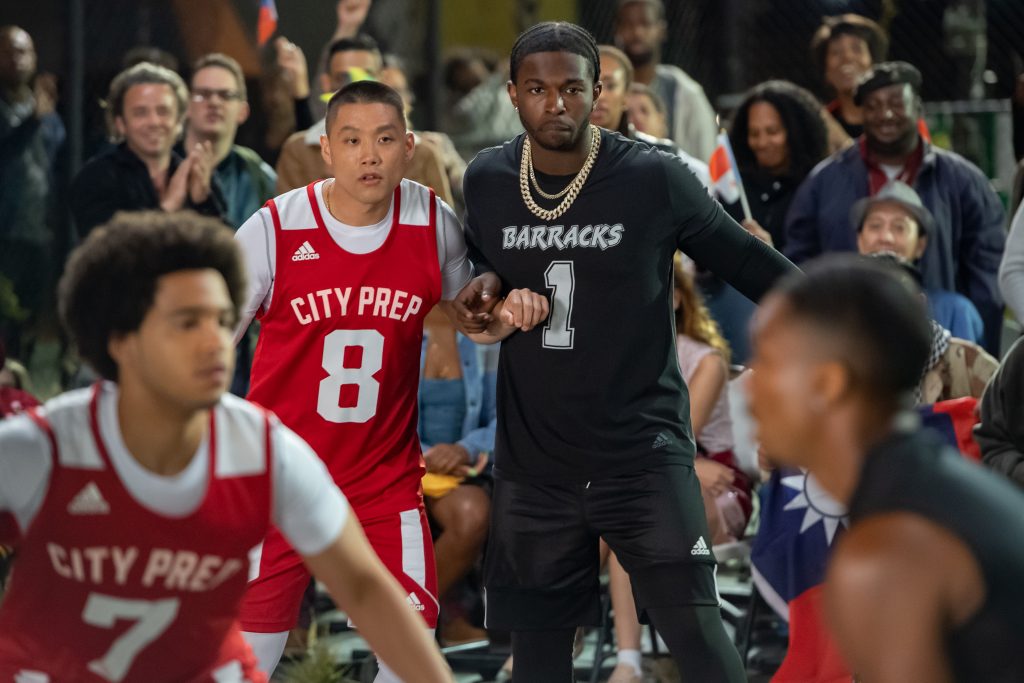
Directed by Eddie Huang
Some language in Mandarin with subtitles
Culture Representation: Taking place in 2019 in New York City, the dramatic film “Boogie” features a racially diverse cast of characters (Asian, African American and white) representing the middle-class and working-class.
Culture Clash: A Chinese American teenager, who’s in his last year of high school, has conflicts with his parents about his dreams of becoming a professional player in the National Basketball Association (NBA).
Culture Audience: “Boogie” will appeal primarily to people who want to see a different type of basketball coming-of-age story, but the movie could be a turnoff because it doesn’t live up to the story’s engaging potential.
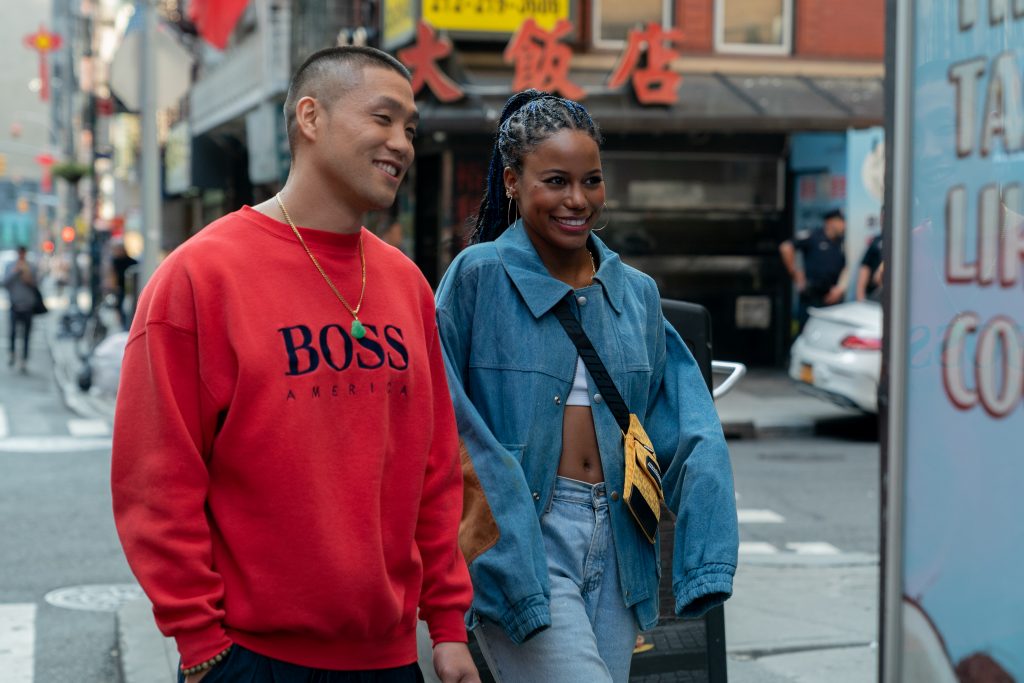
The dramatic film “Boogie” takes a good concept (a Chinese American teenager with goals to play NBA basketball) and squanders it on uneven acting, subpar filmmaking and an obnoxious main character. The movie tries to look gritty and unique. But in the end, it becomes a predictable mush of banality. And unfortunately, “Boogie” panders to some very negative and racist stereotypes of immigrants and urban people of color in the United States.
Written and directed by Eddie Huang, “Boogie” (which takes place in New York City in 2019) has many flaws, but one of the biggest is in the movie’s erratic casting. For starters, almost all the main characters who are supposed to be teenagers in the movie look like they’re in they’re mid-20s or older. It’s distracting and lowers the credibility of this movie, because not once does it look believable that these actors are in the same age group as students in high school.
“Boogie” has a cast that’s mixed with experienced and inexperienced movie actors—and it shows. Taylor Takahashi and the late Bashar Jackson (also known as rapper Pop Smoke), who portray basketball rivals in the movie, make their feature-film debuts in “Boogie,” which is also Huang’s first feature film as a writer/director. Takahashi’s and Jackson’s acting skills are far inferior to those of “Boogie” co-stars Jorge Lendeborg Jr. and Taylour Paige, who also portray high-school students in the movie.
Lendeborg and Paige are way ahead in their acting talent, compared to Takhashi and Jackson. This discrepancy results in some awkward-looking moments in the movie where the more talented/experienced actors have to share scenes with those who are less talented/experienced. It doesn’t help that a lot of the dialogue is just plain awful.
Takahashi portrays the movie’s title character—Alfred “Boogie” Chin (whose Chinese first name is Xiao Ming)—as an entitled, arrogant “not as smart as he thinks he is” brat, who often shows disdain for women and willful ignorance of what it takes to be a respectful and respected human being. He is singularly focused on his goal of becoming a basketball player for the NBA. And he doesn’t seem to care much about learning about life beyond basketball, dating, and getting the perks of possibly becoming rich and famous.
It’s no secret that Asians are rare in the NBA, so the filmmakers of “Boogie” used that hook to make it look like the movie is an “against all odds” story. But one of the lousiest things about this movie is that it’s not even convincing in showing any dazzling basketball skills that Boogie supposedly has. There are too many cutaway shots with obvious body doubles. And so, viewers are left wondering what’s so special about Boogie. He’s definitely not the extraordinary basketball player that the filmmakers want people to think he is.
Most of the movie consists of Boogie getting into conflicts with his family. His parents are Chinese immigrants who’ve settled in the New York City neighborhood of Flushing, Queens. It’s shown in the beginning of the movie that in 2001, when his mother was pregnant with Boogie (who is an only child), Boogie’s parents went to see a fortune teller to get advice about their crumbling marriage and to find out the baby’s gender. The fortune teller said that she didn’t know the gender of the child, but she advised these two spouses that if they stay together, “Love will melt the sharpest sword.”
Boogie’s parents did stay together, but they don’t have a very happy marriage. They also have very different approaches to parenting and how Boogie should reach his NBA goals. Boogie has major issues with his mother, which explains why Boogie has misogynistic tendencies. The movie doesn’t even bother to give Boogie’s mother a first name.
Boogie’s father Lawrence Chin (played by Perry Yung) is fairly lenient with Boogie, except when it comes to basketball. Mr. Chin is an ex-con who is obsessed with the idea that the best way for Boogie to get to the NBA is by defeating a local teen named Monk (played by Jackson), who is a star basketball player at a rival high school in Brooklyn. Mr. Chin believes that basketball talent scouts will flock to Boogie if Boogie triumphs over Monk. It sounds very illogical (because it is), but Mr. Chin is fixated on Monk as the biggest obstacle to Boogie’s basketball dreams.
Boogie’s mother Mrs. Chin (played by Pamelyn Chee), who is a homemaker, thinks that Boogie’s best way to the NBA is through a college basketball scholarship, preferably at a Big 10 university. She’s the family’s disciplinarian and planner. But apparently, she’s terrible at finances because Boogie’s parents are heavily in debt, to the point where they’re past due on their utility bills. Even though Boogie’s parents can’t afford to pay for any college tuition, Boogie and his parents don’t want to apply for financial aid. They want a full scholarship for Boogie, or else he doesn’t want to go to any college.
Mr. Chin has spent time in prison for operating an illegal gambling business of sports betting. He’s still making money this way, but he and his brother Jackie (played by “Boogie” writer/director Huang) have been laundering their gambling money by operating a small business as town car drivers. It’s too bad that this movie uses the very tired cliché that a working-class family of color in a big American city has a patriarch who’s a criminal and/or an absentee father. Because Boogie’s father spent time in prison, he’s trying to make up for that lost time with Boogie.
Mr. Chin tells Jackie about their illegal gambling business, “Keep taking bets through the end of the current football season. Then I want to wash my hands of it. We’re in the basketball business now.” And by that, he means that he expects Boogie to make it to the big leagues of the NBA, so that Boogie can become rich and pass on some of the wealth to his parents.
Early on in the movie, Mr. Chin reminds Boogie that Boogie’s parents transferred him to City Prep, Boogie’s current high school, so that Boogie could have a better chance of being discovered by basketball scouts. Boogie is in his last year of high school, so the pressure is on for him to get an opportunity that will eventually take him to the NBA.
At school, it’s unclear what type of grades that Boogie is getting, but it’s clear he’s not getting into any university on an academic scholarship. In his Advanced Placement English class (the only class that he’s seen attending in this movie), Boogie mouths off at the teacher Mr. Richmond (played by Steve Coulter) in a “know it all” way that’s not endearing. It just makes Boogie look like a pompous idiot.
There are plenty of ways that Boogie shows his crude and offensive side outside the classroom. This is what he has to say about real-life NBA basketball player Jeremy Lin: “Jeremy Lin can suck my dick. He’s more model minority Jesus freak than Asian.”
One of the students in the English class is named Eleanor (played by Paige), who is Boogie’s obvious crush. Boogie’s best friend Richie (played by Lendeborg) is in the same class and is on the school basketball team with Boogie. One day after class, Boogie and Richie are at a school gym and ogling Eleanor and her friend Elissa (played by Alexa Mareka), as they do some weightlifting.
Here’s the way that Boogie tries to make a move on Eleanor: Boogie says to her, “Nice pants.” Eleanor replies, “You’ve got a staring problem.” Boogie replies, “You’ve got a nice vagina.” Eleanor angrily says, “Get the fuck out of here with that bullshit! You better respect my mind!” As Eleanor and Elissa walk away, Boogie smirks to Richie, “She wants it.”
Any self-respecting person would be put off by Boogie’s rude sexism. But one of the many things that’s so annoying about this movie is it brushes off and excuses Boogie’s blatant hostility toward women and makes Eleanor fall for him. A dumb movie like this with a jerk as the main character usually likes to show how he can get a love interest who will roll over and be submissive, no how matter how this jerk insults her.
It’s hard to take Eleanor seriously when she acts like an attention-starved girl who’s willing to overlook Boogie’s disrespectful and selfish attitude, just because she wants a boyfriend. Sure, the movie does the very predictable back-and-forth banter between Boogie and Eleanor, in a very weak attempt to make it look like she’s playing hard to get. But in the end, based on the way that Eleanor is written in this movie, she does exactly what Boogie predicts and expects. Any “romance” in this movie looks very fake.
The movie tries to make it look like Boogie is just trying to have the same mindset of a “thug” rapper, since he and so many of his peers admire rappers. But his disrespectful attitude toward women just makes him look pathetic and ignorant. “Boogie” predictably has a hip-hop soundtrack featuring multiple Pop Smoke songs, such as “AP,” “Fashion” and “Welcome to the Party.” (The movie’s end credits have a dedication to Pop Smoke, who was tragically murdered during a home invasion in 2020.) Pop Smoke does not rap in the movie.
Boogie’s horrible personality isn’t shown in just one isolated incident. When Monk deliberately assaults another player on a street basketball court (the other player’s ankle is broken during the attack), Eleanor expresses her disgust with this bullying, but Boogie tells her that Monk did what he had to do to win. Boogie is so arrogant that he calls his other team members “hot trash” to the team leader Coach Hawkins (played by Domenick Lombardozzi), because Boogie thinks the team would be nowhere without him. And later in the movie, Boogie shows how ill-tempered he is during a crucial basketball game at school, and this temper tantrum costs him dearly.
How do we know that Boogie is a legend in his own mind? He’s not getting any scholarship offers. And the feedback from college basketball scouts, including one named Patrick (played by Lenard McKelvey, also known as real-life radio personality Charlamagne Tha God) is that they might want to recruit Boogie, but not on a scholarship. After witnessing Boogie’s on-court tantrum, another college basketball scout questions Boogie’s mental stability. Coach Hawkins also has reservations about Boogie’s temperament and reliability.
If this movie is supposed to be about Asian cultural pride, it has an odd way of showing it, because it makes most of the Asian characters look like self-hating caricatures. There’s a Chinese insult scene of Boogie and Richie going to Manhattan’s Chinatown and Boogie complaining that he almost forgot how much Chinatown smells bad.
Boogie then sneers, “How is Chinatown next to SoHo? These gremlin keepers ain’t learned how to boutique their shit.” (It’s a reference to the 1984 horror movie “Gremlins” about gremlin creatures that are sold in Chinatown.) Imagine if a white person said this very racist and degrading comment. Just because an Asian person says it doesn’t make it okay.
Boogie is an immature twit who doesn’t have much to offer to the world except basketball skills that definitely are not ready for the NBA. His mother is written as a domineering and lazy shrew, while his father is a morally dubious hustler. The only Asian character in the movie who seems to show common sense is someone named Melvin (played by Mike Moh), an acquaintance of Boogie’s mother whom she asks to become Boogie’s manager.
And here’s an example of the movie’s terrible dialogue. Boogie whines to Eleanor about his ethnicity, with no self-awareness that he perpetuates negative stereotypes: “Chinese people would be so much better if this country didn’t reduce us to beef and broccoli.” Eleanor replies, “You could be so much more too.” Boogie then says, “It’s so hard. I feel like a piece of beef surrounded by sprouted greens and MSG.”
So with all of the family drama, ethnic drama and dating drama that are badly written and sometimes poorly acted in “Boogie,” that leaves the basketball scenes to possibly salvage this dreadful movie. But “Boogie” fails to deliver as a thrilling sports movie too. There’s a big showdown at the end that checks all the boxes of predictable and unimaginative clichés of a basketball game filmed for a movie.
There’s also some phony sentimentality thrown into the story, which contradicts the crass and raw tone that the movie was trying to push on the audience for most of the film. “Boogie” looks like it wanted to be a vulgar and tough portrayal of urban life, as well as a sweet family film. You can’t really have it both ways, or else you end up with a movie like “Boogie,” which is a jumbled, fake-looking and shoddily filmed mess.
Focus Features released “Boogie” in U.S. cinemas on March 5, 2021. The movie’s VOD release date is March 26, 2021.

